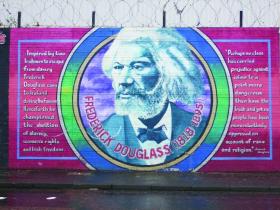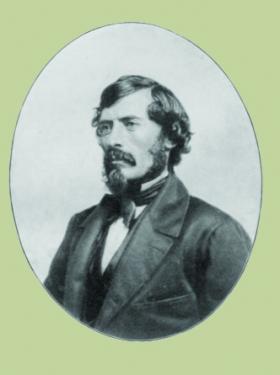TV Eye: The Importance of Being Irish
Published in 18th–19th - Century History, 20th-century / Contemporary History, Issue 3 (May/Jun 2008), Reviews, Volume 16
Downpatrick native Edward Neville Isdell, current CEO of the Coca-Cola Company—one of a disjointed succession of interviews in The Importance of Being Irish with various successful Irish people who were prepared to tell us that we have all done well and that, consequently, being Irish is a Good Thing. (Yellow Asylum Films).
The Importance of Being Irish
RTÉ1, March–April 2008
Yellow Asylum Films/Royal Irish Academy
Frederick Douglass agus na Negroes Bána
TG4, 2 April 2008
Camel Productions
by John Gibney
It goes without saying that Ireland has undergone radical changes in the past two decades. In recent years numerous attempts to explain the origins and nature of these changes have been attempted, with varying degrees of success. RTÉ’s The Importance of Being Irish seems to have been flagged in the spring schedules as something of an addition to this burgeoning genre. Unfortunately, it was an unsuccessful one—assuming, of course, that this is what it was supposed to be, for, despite its glossy production values, the purpose of this series remained unclear as this reviewer watched it. Perhaps it was intended to illustrate the creativity and innovation of Irish people across the world we live in. But to what end? After a potted history of post-war Ireland in the first episode, the series seemed to consist of little more than a disjointed succession of interviews with various successful Irish people who were prepared to tell us that we have all done well and that, consequently, being Irish is a Good Thing. Critical voices were not on display here: indeed, the narcissism and smugness of some of the contributors was breathtaking. There was a strong sense while watching The Importance of Being Irish that this was intended to be the authorised version of ‘Celtic Tiger’ Ireland. The title rather clumsily paraphrased Oscar Wilde, but the blandness of the contents ensured a level of superficiality that Wilde might have appreciated, as the series proved to be every bit as smug as its title might suggest. Instead of a cogent and critical attempt to make sense of modern Ireland, and whatever contribution it has made to the rest of the world, it seemed little more than an extended exercise in stroking the collective middle-class ego of a small island off western Europe that can suffer from a vastly exaggerated sense of its own importance. All in all, a major disappointment.

Mural (and message) of Frederick Douglass on Belfast’s Lower Falls Road—his The narrative of the life of Frederick Douglass was one of the first, and perhaps the most famous, memoirs of slavery. (Camel Productions)
In trying to make sense of where we are today, it might be worth asking harder questions of ourselves. We could start by asking why racism has become such a live issue in the 21st century, when in the 1840s a black former slave from the United States could be fêted on a speaking tour of Ireland precisely because he was an anti-slavery campaigner. Frederick Douglass was born in Maryland but escaped the degradation of Southern slavery at the age of twenty, absconding to the Northern states, where his natural eloquence rapidly made him a prominent abolitionist. Douglass had been taught to read and write by his master’s wife, and soon published The narrative of the life of Frederick Douglass—one of the first, and perhaps the most famous, memoirs of slavery, written by a man who would become perhaps the greatest of abolitionists. The attention it attracted put him in danger, however, and he was forced to leave America. In 1845, on the eve of the Famine, Douglass arrived in Ireland to embark on a speaking tour.
As a slave, he had worked with Irish labourers on the Baltimore docks. Now Douglass could be fêted on a platform with Daniel O’Connell, another great voice against slavery, who introduced him as the ‘Black O’Connell’. Douglass and other former slaves who came to Ireland in the nineteenth century testified to the welcome they received and the lack of prejudice they encountered (though the Free Church of Scotland in Belfast, who picketed Douglass in explicitly racist terms, was an exception). A key strength of this documentary was that it put forward a compelling case, bolstered by extensive extracts from his writings, that his experience of Ireland and the Irish played a fundamental role in his conception of human dignity and freedom. For those who might assume that descriptions of the poverty of the Irish in early nineteenth-century Ireland are exaggerated, it is sobering to note that Douglass compared the degraded living conditions of the Irish peasantry to that of slaves in the American South; equally, his descriptions of the poverty of Dublin’s urban poor retain a shocking power. The lesson learned by Douglass was that poverty, suffering and the crushing of human dignity was not just the lot of the Southern slave: others around the world, even those with white skins, could also be forced to endure them. It was a lesson he would take back to the US.
As he returned to America, however, hundreds of thousands of Irish were making the same journey against the backdrop of the Famine. On arrival in the US, the hostility they encountered meant that they began to compete with African-Americans for a place on the lowest rung of the ladder. The simmering rivalry would culminate in the New York draft riots of 1863, when the prospect of being drafted into the Union army to fight for the freedom of black slaves proved too much for the Irish: African-Americans were murdered (and often horribly mutilated) in the urban upheaval that followed. Douglass was appalled at the newly minted racism of the Irish in America, and was especially disgusted by the outright racism of prominent Irishmen such as John Mitchel, or the refusal of figures such as Father Mathew (from whom Douglass had received the pledge of temperance) to openly disavow the ‘peculiar institution’. Despite this, he attempted to mediate between African-Americans and Irish in the new world. But it seems that our ancestors could be the oppressors as well as the oppressed. How important is that reality to being Irish today? It is nothing to be proud of, but might it be something from which we can learn?

John Mitchell—Douglass was especially disgusted by his outright racism
Ireland had played a role in shaping the universalism of a man who spoke with a moral voice that was probably unequalled in black America until the rise to prominence of Martin Luther King. But there is no hiding the fact that Ireland also provided further examples of all that Douglass opposed. There is a very dark side to the story of Douglass and his relationship to Ireland, but its complexity is unflinchingly revealed in this excellent documentary. Brilliantly made with a funky soundtrack, this was everything that The Importance of Being Irish was not: gripping, intelligent, original and thought-provoking. TG4 regularly outdoes RTÉ on a much smaller budget. It also provides a better service should prospective viewers miss its programmes, as Frederick Douglass agus na Negroes Bána is currently available to be viewed online via the TG4 website (www.tg4.tv). Go!
















